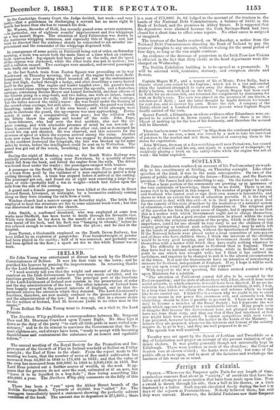SCOTLAND.
Sir James Anderson rendered an account of his Parliamentary steward- ship to his constituency at Stirling, on Thursday sennight. Like other speeches of the kind, it was in the main retrospective. On two of the points of public interest affecting the future—Education, and the Eastern question—Sir James had also something to say. On the former he said- " That a large portion of the community are growing up in ignorance of the very rudiments of knowledge, there can be no doubt. There is an im- mense evil to be deplored in this respect. The number of people in England and Scotland who cannot read or sign their own names is lamentable, and shows to what an extent the want of education prevails. It. is the duty of Government to deal with this evil—it is in their power to do a great deal for the remedy of this state of matters by the institution of a national system of education,—one which all could avail themselves of. The religious part of the question has been the great cause of dispute, but it appears to me that this is a matter with which Government ought not to charge themselves. They ought to see that a good secular education be placed within the reach of all ; while the religious education of the people, which is of the very last importance, (and I for one should be very sorry to see the children of this country growing up without such religious instruction,) may be safely left in the hands of parents and others, without the interference of Government. If the National Schools were placed under a local committee of rate-payers and of those who have children there, I think the interests of the children would be in very good keeping, and that Government should not trouble themselves with a matter with which they have really nothing whatever to do. The difficulty is much greater in Scotland than in England. There they have had no national system of education, while in Scotland we can point to one which has wrought 'well; but I think it has outlived its usefulness, and requires to be changed to suit it to the altered circumstances of the times. It is said the Government have an intention of introducing a measure for Scotland, independent of England. If so, I hope it will be such as we can upon sound principles accept and support." With respect to the war question, Sir James seemed content to rely upon Ministers for a solution.
The attention of Parliament cannot fail also to be occupied by the Eastern question ; and the state of affairs there will, I fear, divert it from more useful subjects, to which otherwise it would have been directed. If we are in- volved in war, which at the present moment seems not unlikely, it will, I fear, be a long time before we obtain the changes and refornis which we would like to see carried out. I think this is a reason why we ought to try to avert by every means in our power this enormous evil, and earnestly seek that everything should be done if possible to prevent it. I have not seen it my duty to become a member of the Peace Society ; but I deprecate the war spirit which appears to prevail to a considerable extent. Many people seem to imagine that because the Government have not plunged into war they have not done their duty, and they say that if they had interfered at first war might have been prevented. I cannot sympathize with such views. I am prepared, however to leave the matter in the hands of the Ministry. I believe they are prepared, whenever the interests and honour of the country require it, to go to war; and they are well prepared to do so."
The speech was well received.
Tuesday was set apart by the Synod of Lothian and Tweeddale as a day of humiliation and prayer on account of the present visitation of epi- demic cholera. It was pretty generally though not universally kept in Edinburgh. There were services in most of the churches; the Court of Session rose at eleven o'clock ; the banks were closed; but some of the public offices were open, and in most of the factories and workshops the business of life went on as usual.




































 Previous page
Previous page